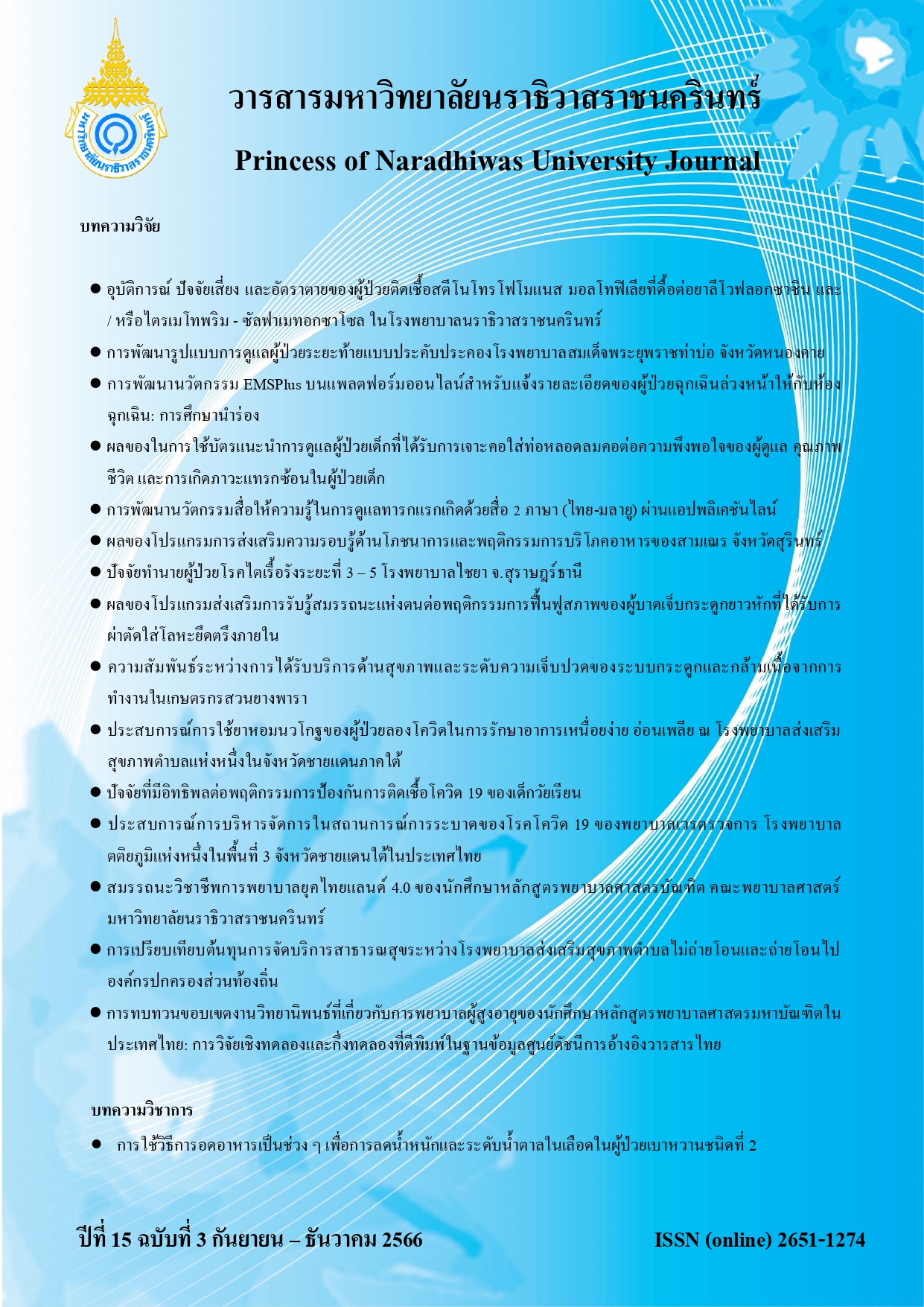สมรรถนะวิชาชีพการพยาบาลยุคไทยแลนด์ 4.0 ของนักศึกษาหลักสูตรพยาบาลศาสตรบัณฑิต คณะพยาบาลศาสตร์ มหาวิทยาลัยนราธิวาสราชนครินทร์
คำสำคัญ:
สมรรถนะวิชาชีพการพยาบาล, ยุคไทยแลนด์ 4.0, นักศึกษาหลักสูตรพยาบาลศาสตรบัณฑิต, มหาวิทยาลัยนราธิวาสราชนครินทร์บทคัดย่อ
การวิจัยเชิงพรรณนานี้ มีวัตถุประสงค์เพื่อ 1) ศึกษาสมรรถนะวิชาชีพการพยาบาลยุคไทยแลนด์ 4.0 ด้านจริยธรรม จรรยาบรรณ และกฎหมาย 2) ศึกษาสมรรถนะวิชาชีพการพยาบาลยุคไทยแลนด์ 4.0 ด้านคุณลักษณะเชิงวิชาชีพ และ 3) ศึกษาสมรรถนะวิชาชีพการพยาบาลยุคไทยแลนด์ 4.0 ด้านการสื่อสารและสัมพันธภาพของนักศึกษาหลักสูตรพยาบาลศาสตรบัณฑิต คณะพยาบาลศาสตร์ มหาวิทยาลัยนราธิวาสราชนครินทร์ ประชากรและกลุ่มตัวอย่างเป็นนักศึกษาหลักสูตรพยาบาลศาสตรบัณฑิต คณะพยาบาลศาสตร์ มหาวิทยาลัยนราธิวาสราชนครินทร์ ที่กำลังศึกษาช่วงชั้นปีที่ 3 และปีที่ 4 จำนวน 30 คน โดยกำหนดขนาดกลุ่มตัวอย่างด้วยการวิเคราะห์อำนาจจากการทดสอบ เครื่องมือวิจัยประกอบด้วย 1) เครื่องมือที่ใช้ในการวิจัย คือ คู่มือการศึกษาสมรรถนะวิชาชีพพยาบาลยุคไทยแลนด์ 4.0 ที่เหมาะสมของนักศึกษาหลักสูตรพยาบาลศาสตรบัณฑิต คณะพยาบาลศาสตร์ มหาวิทยาลัยนราธิวาสราชนครินทร์ และ 2) เครื่องมือที่ใช้ในการเก็บข้อมูล คือ แบบประเมินสมรรถนะวิชาชีพการพยาบาลยุคไทยแลนด์ 4.0 ที่เหมาะสมของนักศึกษาหลักสูตรพยาบาลศาสตรบัณฑิต คณะพยาบาลศาสตร์ มหาวิทยาลัยนราธิวาสราชนครินทร์ โดยมีผู้ทรงคุณวุฒิตรวจเครื่องมือวิจัย 3 คน มีค่าดัชนีความตรงเชิงเนื้อหาเท่ากับ 1 การวิเคราะห์ข้อมูลโดยใช้สถิติเชิงพรรณนา
ผลการวิจัย พบว่า สมรรถนะวิชาชีพการพยาบาลยุคไทยแลนด์ 4.0 ที่เหมาะสมโดยรวม อยู่ในระดับมาก (M = 4.66, S.D. = 0.32) โดยเมื่อพิจารณาเป็นรายด้านพบว่าทุกด้านอยู่ในระดับมาก ดังนี้ สมรรถนะด้านจริยธรรม จรรยาบรรณ และกฎหมาย มีค่าเฉลี่ยสูงสุด (M = 4.70, S.D. = 0.31) รองลงมา คือ สมรรถนะด้านคุณลักษณะเชิงวิชาชีพ (M = 4.69, S.D. = 0.35) และสมรรถนะด้านการสื่อสารและสัมพันธภาพมีค่าเฉลี่ยต่ำที่สุด (M = 4.58, S.D. = 0.38) ตามลำดับ
เอกสารอ้างอิง
Bawornthip, P., & Krithira, P. (2018). Community Nurse Roles in Using Health Care Technology for Patients with Hypertension in Thailand 4.0. Journal of Nursing Association of Thailand, Northern Branch. 25(1), 14-22.
Bureau of Public Health Administration (2017). Ministry of Public Health, Health Driving the health service system Development Plan. (2017-2021). Retrieved September 19, 2022 from https://phdb.moph.go.th/main/.
Chanphen, R. (2021). The effectiveness of the health promotion program for patients with hypertension in hypertension clinic Damnoen Saduak Hospital Ratchaburi Province. Retrieved June 26, 2023 from https://he02.tci-thaijo.org/index.php/ RHQJ/article/ view/251916/172099.
Chansawat, C. (2010). Factors of Professional Nursing Competency, Southern Community Hospital. Master of Nursing Science Thesis Nursing Administration Program, Faculty of Nursing, Chulalongkorn University. (in Thai)
Cohen, J. (1977). Statistical Power Analysis for the Behavioral Sciences (Revised Ed.). Retrieved June 25, 2023 from https://www.scirp.org/(S(i43dyn45teexjx455qlt3d2q))/reference / References Papers.aspx?ReferenceID=1985761.
Edwards, S., & Axe, S. (2015). The 10 'R's of safe multidisciplinary drug administration. Nurse Prescribing, 13(8), 398-406. Retrieved June 26, 2023 from https://bnu.repository.guildhe .ac.uk/id/eprint/9407/1/Edwards,%20Sharon%20Axe,%20Sue%20%2010%20%E2%80%98R %E2%80%99s%20of%20safe%20multidisciplinary%20drug%20administration.pdf
Hanucharurnkul, S., & Phanphakdi, O. (2010). Advanced practice nursing: Integration into practice. Bangkok: Thailand nursing and midwifery council. (in Thai)
Kalla, S., Chantra, R., Sornkasetrin, A., & Kansukcharoen, A. (2016). Synthesis of Research on Formal Instructional Models.Nurse. Journal of Nursing, Ministry of Public Health, 93-108.
Khaemanee, T. (2013). Teaching Science: Body of Knowledge for Effective Learning Process. 17th ed. Bangkok: Chulalongkorn University. (in Thai)
Khonboon, R., & Deom, A. (2020). Guidelines for the development of learning achievement in maternal nursing subjects. Infant and midwifery 2 among nursing students Asian Graduate College. Asian Graduate College Journal. 10, (1), 147-155.
McClelland, D.C. (1973). Testing for competence rather than intelligence. American Psychologist, 28(1), 1-14.
Office of the Public Sector Development Commission. (2016). Blueprint Model Thailand 4.0 Driving Thailand to Stable, Prosperous and Sustainable. Retrieved October 14, 2017 from https://www.opdc.go.th.
Thailand Nursing and Midwifery Council. (2009). Announcement of the Nursing Council on the competency of professional nurses. Retrieved January 10, 2022. from http://www.tnc.or.th/ news_detail.php?news_ id=2133.
Thongkaew, T. (2013). Competency: principles and practices. Suan Dusit Rajabhat University. Retrieved September 20, 2022 from http://www.competency.mju.ac.th/doc/22141.doc.
Wansa, P. (2017). Thailand Health 4.0 challenges and opportunities. Journal of the Thai Medical Informatic Association. 1, 31-36.
Wongrattana, C. (2010). Techniques in uing statistics for research. (12th ed.), Nonthaburi. Thai Niramitkit Interprogessive. (in Thai)
เผยแพร่แล้ว
รูปแบบการอ้างอิง
ฉบับ
ประเภทบทความ
สัญญาอนุญาต
ลิขสิทธิ์ (c) 2023 วารสารมหาวิทยาลัยนราธิวาสราชนครินทร์

อนุญาตภายใต้เงื่อนไข Creative Commons Attribution-NonCommercial-NoDerivatives 4.0 International License.




